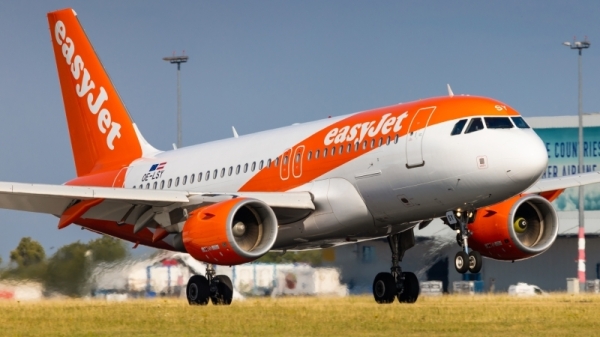EasyJet bets on hydrogen aircraft to end flight emissions

Budget airline easyJet is banking on hydrogen aircraft to reach net-zero emissions by 2050, betting that the novel technology will revolutionise the environmental impact of flying in the coming decades.
While most European airlines are focused primarily on green jet fuels made from waste biofuels and synthetic fuels to cut emissions, easyJet has committed itself as an early adopter of clean technologies.
“For our business model, the short-haul [flight] model, the end goal is net-zero emissions and net-zero technology,” Thomas Haagensen, easyJet’s European director, told EURACTIV.
“We want to make sure that investments in [sustainable aviation fuels] don’t distract from any investments in hydrogen, for instance, where we see the future of aviation for short-haul.”
While sustainable aviation fuels (SAF) are included in easyJet’s pathway to reach net-zero emissions by 2050, novel technologies form a crucial pillar of the airline’s strategy.
“Everyone needs to start thinking about the future technology and about hydrogen as a potential solution,” said Haagensen.
While carbon-free flying is seen as the holy grail for the aviation industry, a host of technical barriers are still to be overcome before zero-emission planes take to the skies.
Hydrogen is considerably more voluminous than kerosene, meaning it requires more space for storage – leaving less space for passengers or cargo.
To remain in liquid form, it must be kept at a cryogenic temperature of below 253 degrees Celsius, before being converted to gas for combustion.
As hydrogen gas burns at a higher temperature than kerosene, the plane must also be adapted to withstand the extreme heat.
Airport changes will also be needed, with new fueling and storage infrastructure, as well as a possible rethink of boarding procedures. Safety questions remain over whether hydrogen planes can be refuelled with passengers on board.

Rolls-Royce, easyJet successfully test hydrogen-powered jet engine
Britain’s Rolls-Royce said it has successfully run an aircraft engine on hydrogen, a world aviation first that marks a major step towards proving the gas could be key to decarbonising air travel.
Hydrogen ‘more promising’
Despite the challenges, progress is being made. In November 2022 British engine maker Rolls Royce successfully tested a hydrogen-powered engine. While the test took place on the ground, there is a longer-term ambition to carry out flight tests.
The world’s largest aircraft manufacturer, Airbus, has also announced plans to test a hydrogen-powered jet engine by the middle of the decade.
Asked by EURACTIV about the challenges in switching to hydrogen, Haagensen said that the massive investment in research and testing will see barriers overcome.
“There are many reasons why [hydrogen] is promising. It is easy to produce; there are no limitations apart from the renewable energy to produce it – we’re not talking about rare materials, et cetera. And it has three times the power for the same weight as kerosene,” he said.
On the question of electric aircraft, which are also considered a zero-emission solution for short trips, easyJet is “open minded as to whatever works” to reach their “end goal of having a zero emission aircraft,” said Haagensen.
“That’s really what we want and no interim measure like SAF, et cetera. Electric could be an option, but at this point in time, it looks like hydrogen is more promising,” he added.
Flight taxes
The airline industry is facing a challenging period, as it attempts to recover from the downturn wrought by COVID-19 whilst navigating increasingly tough green legislation.
In addition to a green jet fuel mandate, EU legislators are considering taxing kerosene for the first time.
Asked about the growing raft of green measures, Haagensen said that enacting policies that unduly push up the cost of flying goes against the wishes of most EU citizens.
“The question is not should we fly less, but how do we fly better?” he said.
“If you start taxing and reducing [flights], what happens? Then you basically limit flying to the happy few or the wealthier people, which is really not what I think Europe wanted when it freed up the European sky.”
Rather than a tax on kerosene, easyJet would prefer taxes that follow the “polluter pays” principle.
“The tax needs to be directly linked to the CO2 emissions and not a flat tax,” he said, as a polluter pays tax would ensure that “there is a real incentive for airlines to invest in new technology, to invest in newer aircraft”.
Carbon capture
Despite efforts to rein in emissions through measures such as more efficient aircraft, greater quantities of sustainable aviation fuels, and zero-emission technologies, a sizable portion of aviation emissions are expected to remain by 2050.
For their part, easyJet foresees a 78% reduction in carbon by 2050. To reach net zero, the remaining 22% of emissions will need to be captured and stored.
To aid in this, the company is working with Airbus to set up a direct air capture (DAC) facility in the United States, which sucks carbon from the atmosphere and injects it underground.

Airbus to test hydrogen jet engine in step towards zero emission aviation
Airbus has announced plans to test a hydrogen-powered jet engine by the middle of the decade, as the world’s largest plane manufacturer pushes to meet its 2035 deadline of building a zero emission aircraft.



